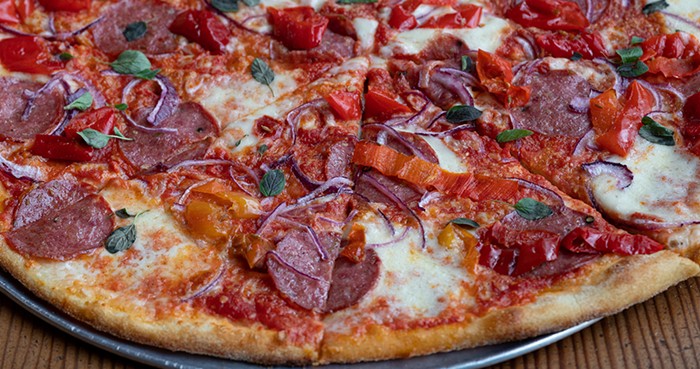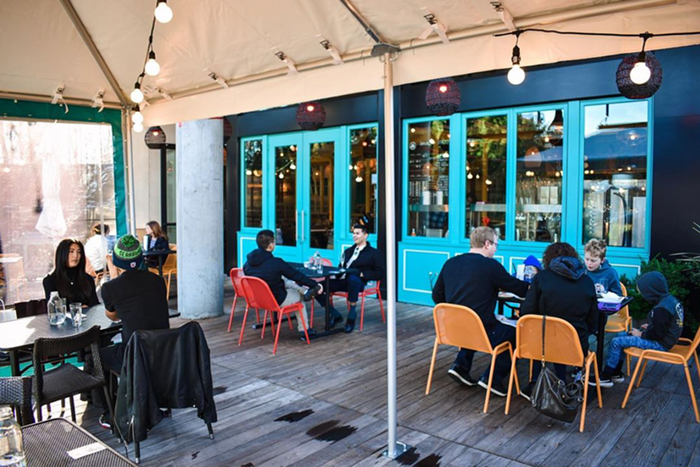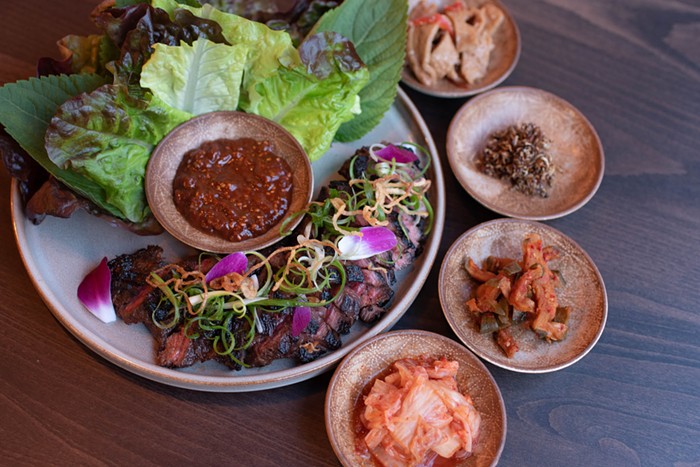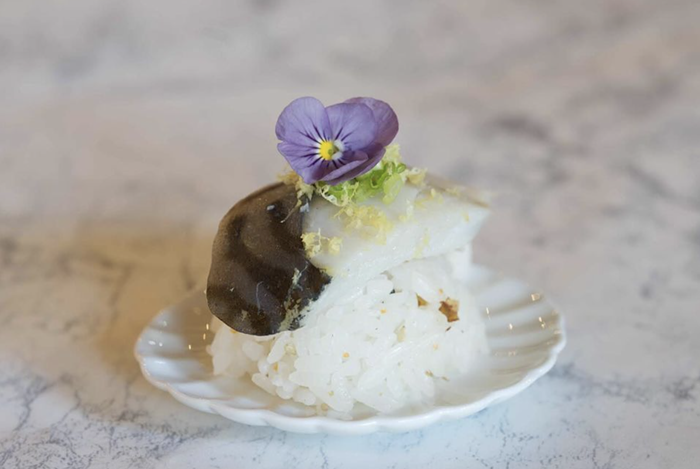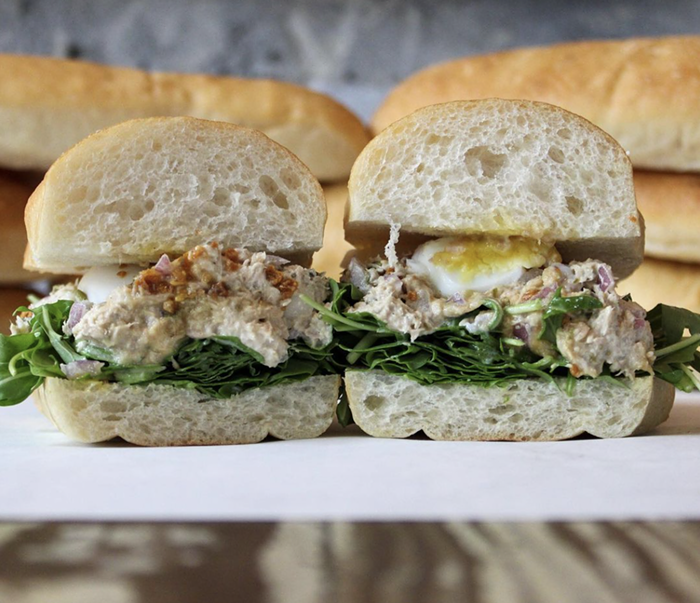MONDAY: I've already been to Chico Madrid—a tiny cafe and bar on the west slope of Capitol Hill—four or five times since it opened at the end of March, but I somehow missed that it's closed on Mondays. Having biked over with my stomach all set for one of their extremely tasty Spanish-style sandwiches for lunch, all there is to do is press my nose up against the glass and feel bereft. The inside looks just right for contemporary Spain: chalkboard menu, spare furniture with faux-marble tabletops, a horseshoe bar. The stuff in the jars and tins on the shelves isn't just for show; it actually ends up on your plate. Until tomorrow, Chico Madrid.
TUESDAY: After work, all the (few) tables at Chico Madrid are taken except for a two-top next to two women loudly discussing their travels in Spain and a larger, further-from-loud-ladies corner table. "Have a seat wherever," a server says encouragingly. We look at the corner table: "But there's only two of us... what if a bigger party comes in?" "You're here now!" she says. Everyone who works here is unfailingly nice and always interested in your happiness.
We eat a salad of whole, crisp leaves of romaine lettuce piled up prettily on an oblong white plate with bits of purple picked onion and salty-tart preserved lemon, plus a light dusting of grated Manchego ($7). The sherry vinaigrette has a bright bite, and you might not notice the garlic breadcrumbs acting as little dressing-soaker-uppers, stowing away on the lettuce leaves. The pan con tomate ($4) is a classic Spanish toast snack, just garlicky pulped tomato with sea salt and olive oil, spread here on a slice of slightly sour Columbia City campagne. Like everything at Chico Madrid, it is not rocket science; it is merely a simple, authentically Spanish snack that is really good.
The bocadillos—the baguette sandwiches found everywhere in Spain—are made with lightly toasted Columbia City ficelle drizzled with olive oil. You can taste the high quality of the canned tuna in the bonito one ($8), which comes with a restrained amount of aioli and most of the ingredients from the romaine salad; the bits of preserved lemon make this good sandwich great.
WEDNESDAY: Chico Madrid makes baked goods in the tiny kitchen, using co-owner Franz Gilbertson's recipes from his other endeavor, the revered Honoré Bakery in Ballard. I stop by to get snacks for a meeting at work. The woman behind the counter and I discuss the scones ($3.50). "Dey're reallfy goodf," says a guy with his mouth full sitting at the counter nearby. "And he's eating a day-old one," she says. The only reason I am not hailed as a full-on hero at the meeting is because some Stranger staffers say the sweet stuff—like the airy, subtle Magdalena lemon cake ($2.50)—isn't sweet enough. Philistines.
THURSDAY: Midafternoon, a well-known local chef and his companion occupy the "But you're here now!" table, drinking a bottle of wine. Chefs know how to live. Also, bottles of well-chosen wine, both Spanish and local, are absurdly cheap at Chico Madrid: just the price of two glasses plus a couple dollars more. There are four glasses to a bottle, so if you're not getting a bottle, you're ripping yourself off. Unfortunately, I am alone and must return to work, so I eat a little dish of squintingly acidic pickled mushrooms ($6), impaling each one satisfyingly with a toothpick, and the bacon bocadillo ($8). It's got three big, thick strips of Zoe's best, tomato pulp (so much less annoyingly slidey in a sandwich than tomato slices), a modicum of aioli, and salsa verde, providing drips of herby green olive oil. The best bites are at the end, when the bread gets all soaked and garlicky but still holds up. Also on the plate: squiggly little pale-green pickled peppers, eye-wateringly spicy. It is an excellent lunch.
In the afternoon quiet, I notice that the tiles around the horseshoe bar are crimson and pink and mauve; there's an old-timey photo of the Plaza de España in Madrid, a plastic bull's head framed on a red velvet background, a bowl of lemons on top of the sangria machine. Oh, yes: Chico Madrid has a sangria machine, one of those rectangular, clear containers with the liquid circulating alluringly inside—the kind you associate with longed-for childhood fruit punch. Someone working notices me staring at it, and when I regretfully decline to have some, he offers the consolation prize of the information that they're soon getting another one, to dispense white sangria. What's better than a sangria machine? Two sangria machines.
FRIDAY: After work, wine and snacks. The tortilla Espanola ($6)—the Spanish omelet that's sliced up and served cold, with aioli for dipping—is plump and tender, with just enough salt. This plus a glass of cool verdejo ($8/$18 bottle) feels like the start of a great summer.
SATURDAY: The sangria must be sampled. A pint glass full, with lots of ice and a curl of orange rind, and without any bitter rindy taste, costs $6. "Would you like a straw?" the server asks; well, sure! We don't intend to get anything else, but the woman behind the counter starts slicing jamon serrano on the shiny red slicer. She's wearing a T-shirt from the Cuff. Meat must be had, plus soft Garrotxa cheese; a few slices of such things are $2 each, which kicks the ass of prices elsewhere (ahem, Cure).
Also available at Chico Madrid: kalimotxo, the acquired taste of tempranillo mixed with Coca-Cola—here, Mexican Coke, for that real-cane-sugar taste ($5). And two porrons—the long-spouted glass pitchers used in Spain for hygienically dispensing shared wine into different people's mouths. The server mentions how when she lived in Spain, you could get wine cheaper than bottled water. Sigh.
SUNDAY: An espresso and a pan con chocolate—bittersweet chocolate melting on slightly tangy campagne toast ($4)—is an antidote for Sunday afternoon droopiness. Also, messy. A woman sits with her fuzzy white dog at the little red metal tables outside. The cloudy sky clears. ![]()

